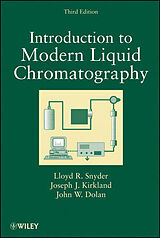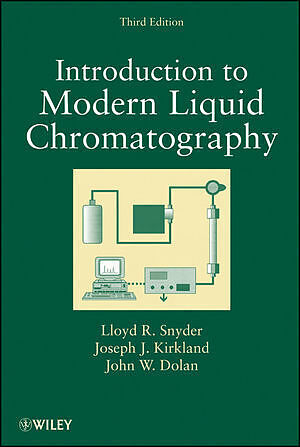Liquid Chromatography 3e
Einband:
Fester Einband
EAN:
9780470167540
Untertitel:
Englisch
Genre:
Chemie
Autor:
Lloyd R Snyder, Joseph J Kirkland, John W Dolan
Herausgeber:
Wiley
Auflage:
09003 Auflage 3rd edition
Anzahl Seiten:
960
Erscheinungsdatum:
01.12.2009
ISBN:
978-0-470-16754-0
The latest edition of the authoritative reference to HPLC High performance liquid chromatography (HPLC) is today the leading technique for chemical analysis and related applications, with an ability to separate, analyze, and/or purify virtually any sample.
The latest edition of the authoritative reference to HPLC
High-performance liquid chromatography (HPLC) is today the leading technique for chemical analysis and related applications, with an ability to separate, analyze, and/or purify virtually any sample. Snyder and Kirkland's Introduction to Modern Liquid Chromatography has long represented the premier reference to HPLC. This Third Edition, with John Dolan as added coauthor, addresses important improvements in columns and equipment, as well as major advances in our understanding of HPLC separation, our ability to solve problems that were troublesome in the past, and the application of HPLC for new kinds of samples.
This carefully considered Third Edition maintains the strengths of the previous edition while significantly modifying its organization in light of recent research and experience. The text begins by introducing the reader to HPLC, its use in relation to other modern separation techniques, and its history, then leads into such specific topics as:
* The basis of HPLC separation and the general effects of different experimental conditions
* Equipment and detection
* The column--the "heart" of the HPLC system
* Reversed-phase separation, normal-phase chromatography, gradient elution, two-dimensional separation, and other techniques
* Computer simulation, qualitative and quantitative analysis, and method validation and quality control
* The separation of large molecules, including both biological and synthetic polymers
* Chiral separations, preparative separations, and sample preparation
* Systematic development of HPLC separations--new to this edition
* Troubleshooting tricks, techniques, and case studies for both equipment and chromatograms
Designed to fulfill the needs of the full range of HPLC users, from novices to experts, Introduction to Modern Liquid Chromatography, Third Edition offers the most up-to-date, comprehensive, and accessible survey of HPLC methods and applications available.
Autorentext
Lloyd R. Snyder, PhD, is a Principal at LC Resources in Walnut Creek, California. He is the author or coauthor of several books including An Introduction to Separation Science, Introduction to Modern Liquid Chromatography, Second Edition, the bestselling Practical HPLC Method Development, Second Edition, and the comprehensive High-Performance Gradient Elution, all published by Wiley. Joseph J. Kirkland, PhD, is Vice President of Research and Development for Advanced Materials Technology, Inc., and coauthor of Introduction to Modern Liquid Chromatography, Second Edition, Practical HPLC Method Development, Second Edition, and Modern Size-Exclusion Liquid Chromatography, Second Edition, all published by Wiley. John W. Dolan, PhD, is a Principal at LC Resources. He is author of the popular "LC Troubleshooting" column in LCGC magazine and coauthor with Lloyd Snyder of Troubleshooting LC Systems and High-Performance Gradient Elution.
Klappentext
The latest edition of the authoritative reference to HPLC High-performance liquid chromatography (HPLC) is today the leading technique for chemical analysis and related applications, with an ability to separate, analyze, and/or purify virtually any sample. Snyder and Kirkland's Introduction to Modern Liquid Chromatography has long represented the premier reference to HPLC. This Third Edition, with John Dolan as added coauthor, addresses important improvements in columns and equipment, as well as major advances in our understanding of HPLC separation, our ability to solve problems that were troublesome in the past, and the application of HPLC for new kinds of samples. This carefully considered Third Edition maintains the strengths of the previous edition while significantly modifying its organization in light of recent research and experience. The text begins by introducing the reader to HPLC, its use in relation to other modern separation techniques, and its history, then leads into such specific topics as: * The basis of HPLC separation and the general effects of different experimental conditions * Equipment and detection * The column--the "heart" of the HPLC system * Reversed-phase separation, normal-phase chromatography, gradient elution, two-dimensional separation, and other techniques * Computer simulation, qualitative and quantitative analysis, and method validation and quality control * The separation of large molecules, including both biological and synthetic polymers * Chiral separations, preparative separations, and sample preparation * Systematic development of HPLC separations--new to this edition * Troubleshooting tricks, techniques, and case studies for both equipment and chromatograms Designed to fulfill the needs of the full range of HPLC users, from novices to experts, Introduction to Modern Liquid Chromatography, Third Edition offers the most up-to-date, comprehensive, and accessible survey of HPLC methods and applications available.
Zusammenfassung
The latest edition of the authoritative reference to HPLCHigh-performance liquid chromatography (HPLC) is today the leading technique for chemical analysis and related applications, with an ability to separate, analyze, and/or purify virtually any sample.
Inhalt
PREFACE. GLOSSARY OF SYMBOLS AND ABBREVIATIONS. 1 INTRODUCTION. 1.1 Background Information. 1.2 A Short History of HPLC. 1.3 Some Alternatives to HPLC. 1.4 Other Sources of HPLC Information. References. 2 BASIC CONCEPTS AND THE CONTROL OF SEPARATION. 2.1 Introduction. 2.2 The Chromatographic Process. 2.3 Retention. 2.4 Peak Width and the Column Plate Number N. 2.5 Resolution and Method Development. 2.6 Sample Size Effects. 2.7 RELATED TOPICS. References. 3 EQUIPMENT. 3.1 Introduction. 3.2 Reservoirs and Solvent Filtration. 3.3 Mobile-Phase Degassing. 3.4 Tubing and Fittings. 3.5 Pumping Systems. 3.6 Autosamplers. 3.7 Column Ovens. 3.8 Data Systems. 3.9 Extra-Column Effects. 3.10 Maintenance. References. 4 DETECTION. 4.1 Introduction. 4.2 Detector Characteristics. 4.3 Introduction to Individual Detectors. 4.4 UV-Visible Detectors. 4.5 Fluorescence Detectors. 4.6 Electrochemical (Amperometric) Detectors. 4.7 Radioactivity Detectors. 4.8 Conductivity Detectors. 4.9 Chemiluminescent Nitrogen Detector. 4.10 Chiral Detectors. 4.11 Refractive Index Detectors. 4.12 Light-Scattering Detectors. 4.13 Corona-Discharge Detector (CAD). 4.14 Mass Spectral Detectors (MS). 4.15 Other Hyphenated Detectors. 4.16 Sample Derivatization and Reaction Detectors. References. 5 THE COLUMN. 5.1 Introduction. 5.2 Column Supports. 5.3 Stationary Phases. 5.4 Column Selectivity. 5.5 Column Hardware. 5.6 Column-Packing Methods. 5.7 Column Specifications. 5.8 Column Handling. References. 6 REVERSED-PHASE CHROMATOGRAPHY FOR NEUTRAL SAMPLES. 6.1 Introduction. 6.2 Retention. 6.3 Selectivity. 6.4 Method Development and Strategies for Optimizing Selectivity. 6.5 Nonaqueous Reversed-Phase Chromatography (NARP). 6.6 Special Problems. References. 7 IONIC SAMPLES: REVERSED-PHASE, ION-PAIR, AND IONEXCHANGE CHROMATOGRAPHY. 7.1 Introduction. 7.2 Acid-Base Equilibria and Reversed-Phase Retention. 7.3 Separation of Ionic Samples by Reversed-Phase Chromatography (RPC). 7.4 Ion-Pair Chromatography (IPC). 7.5 Ion-Exchange Chromatography (IEC). References. 8 NORMAL-PHASE CHROMATOGRAPHY. 8.1 Introduction. 8.2 Retention. 8.3 Selectivity. 8.4 Method-Development Summary. 8.5 Problems in the Use of NPC. 8.6 Hydrophilic Interaction Chromatography (HILIC). References. 9 GRADIENT ELUTION. 9.1 Introduction. 9.2 Experimental Conditions and Their Effects on Separation. 9.3 Method Dev…

Leider konnten wir für diesen Artikel keine Preise ermitteln ...
billigbuch.ch sucht jetzt für Sie die besten Angebote ...
Die aktuellen Verkaufspreise von 6 Onlineshops werden in Realtime abgefragt.
Sie können das gewünschte Produkt anschliessend direkt beim Anbieter Ihrer Wahl bestellen.
Loading...
Die aktuellen Verkaufspreise von 6 Onlineshops werden in Realtime abgefragt.
Sie können das gewünschte Produkt anschliessend direkt beim Anbieter Ihrer Wahl bestellen.
| # | Onlineshop | Preis CHF | Versand CHF | Total CHF | ||
|---|---|---|---|---|---|---|
| 1 | Seller | 0.00 | 0.00 | 0.00 |
